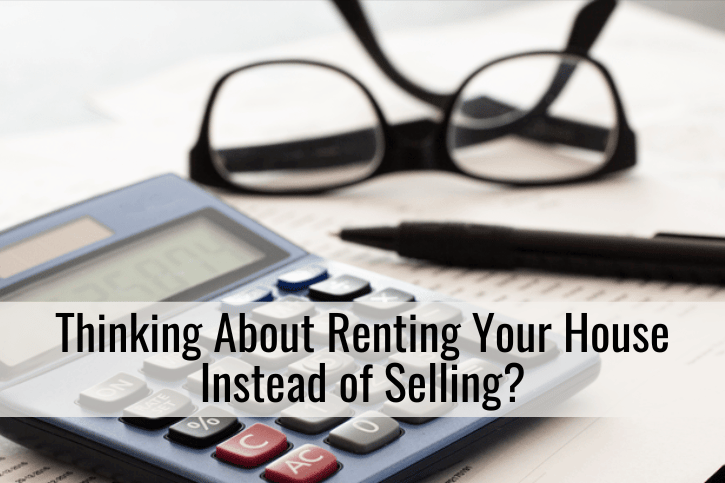You’ve put your house on the market, had some showings, and waited for that perfect offer—but it hasn’t come. You’re now asking yourself, “What do I do if it doesn’t sell?” For many homeowners across Texas and beyond, that question often turns into another one: “Should I just rent it instead?”
If you’ve been thinking about renting your house instead of selling, pause for a moment before you make that leap. It can seem like a smart short-term solution, but it can quickly become more complicated than you expect. I’m Robbie English, Broker and REALTOR at Uncommon Realty, and I’ve helped countless homeowners navigate this very decision. Whether you’re in Austin, Cedar Park, Leander, or anywhere in Central Texas, I want you to make the choice that truly serves your goals, not one that creates more stress or risk.
Below, we’ll explore everything you need to know before turning your for-sale sign into a for-rent listing, plus why partnering with a seasoned professional can make all the difference in how this decision shapes your future.

TLDR: Key Takeaways when Thinking About Renting Your House Instead of Selling?
- Renting instead of selling can be profitable—but only if the numbers and logistics make sense.
- Being a landlord is far from passive income; it’s active property management with legal and financial obligations.
- Repairs, maintenance, insurance, and vacancies can quickly eat into rental profits.
- Revisiting your pricing and marketing strategy might make selling possible after all.
- Robbie English, Broker and REALTOR at Uncommon Realty, provides expert guidance to help you evaluate your best move.
The Rise of the “Accidental Landlord”
Over the past few years, more homeowners have found themselves in an unexpected position: they can’t sell at the price they hoped for, and they’re not ready to let the property sit vacant. That’s when the idea of renting comes up. Professionals often refer to this as becoming an accidental landlord. It’s a situation where your original plan was to sell, but when that didn’t pan out, you decide to lease the home until market conditions improve.
The problem is that what begins as a temporary solution can evolve into a long-term commitment. Many homeowners underestimate the effort required to maintain a rental property, manage tenants, and stay compliant with landlord-tenant laws. It sounds simple: “I’ll just find someone to rent it.” But the reality is rarely that easy.
If you’re thinking about renting your house instead of selling, you need to understand both the financial and emotional implications of that choice. And that’s exactly what we’re going to unpack here.
Why More Homeowners Are Considering Renting Right Now
Today’s real estate market feels very different from what it was just a few years ago. Many buyers are struggling with affordability, which means some homes take longer to sell or attract offers below a seller’s expectations. Homeowners who still need to move—whether for work, lifestyle changes, or personal reasons—sometimes decide to rent their homes instead of lowering the price.
At first glance, it seems like a win-win. You hold onto your asset, wait for appreciation, and collect rent each month. But let’s take a closer look. Holding costs, management time, repairs, taxes, and tenant turnover can make those profits shrink quickly. Renting isn’t the easy fallback many assume it is.
That’s why I always tell clients: before you jump into becoming a landlord, step back and look at the full picture. As someone who’s spent decades in real estate, I’ve seen how quickly a “temporary rental” can become a long-term headache if not approached with clear strategy.
Step One: Evaluate Whether Your Home Has Rental Potential
Every home isn’t automatically a great rental. The first thing I advise my clients to do is evaluate whether the property is even viable as an income-producing asset.
Ask yourself a few key questions:
- Is the property in a neighborhood that attracts renters?
- What is the average rent for homes like yours nearby?
- Would your mortgage, taxes, insurance, and maintenance costs be covered by that rent?
- Does the home need updates, cleaning, or repairs to meet rental standards?
If the math doesn’t work, or if the home would require significant investment to become rental-ready, selling might be a more practical option. A home that doesn’t generate positive cash flow can quickly turn into a financial drain.
When clients come to me at Uncommon Realty with this question, I run rental market analyses alongside comparable sales data. That allows you to see both sides of the equation—what you could earn by renting versus what you could net by selling. This data-driven approach helps you make an informed, confident decision.
Step Two: Understand What Being a Landlord Really Means
I’ve met many homeowners who believed that renting their house would be “passive income.” But managing a property isn’t passive at all—it’s hands-on and often stressful.
Tenants call when the HVAC stops working in the middle of July. They call when there’s a plumbing leak, a broken appliance, or a pest issue. They sometimes miss rent payments or break leases early. You’ll need to handle repairs, inspections, and legal compliance issues. You may even face disputes over deposits or damages.
If you’re moving out of state or already stretched thin with work and family obligations, that burden can grow heavy. You can hire a property manager, but that usually costs around ten percent of the monthly rent, plus additional fees for leasing, repairs, and renewals.
If you’re thinking about renting your house instead of selling, consider your time, temperament, and tolerance for risk. Do you want to manage tenants and maintenance, or would you rather finalize a sale and move forward with peace of mind?
For many homeowners, the stress and unpredictability of being a landlord outweigh the temporary benefit of monthly rent checks.
Step Three: Factor in the True Costs of Renting
Even when the rent seems like it will cover your mortgage, hidden costs often lurk beneath the surface. Renting brings a new set of financial responsibilities, and they can add up fast.
First, your insurance will change. Homeowner’s insurance won’t cover tenant-related damage, so you’ll need a landlord policy. Those typically cost about 25% more. You’ll also need to budget for maintenance, repairs, vacancy periods, advertising costs, and possible property management fees.
And don’t forget taxes. Rental income is taxable, and certain deductions—while helpful—require careful documentation. You may also face higher property taxes if your home loses its homestead exemption once it becomes a rental.
All these elements can dramatically alter your financial outlook. Before you decide, run the numbers with someone who understands both the local rental market and the long-term implications. At Uncommon Realty, that’s exactly the kind of analysis my team and I provide.
Step Four: Consider How Renting Impacts Your Long-Term Goals
Your home isn’t just a property; it’s a part of your financial strategy. Renting it out changes that dynamic. Instead of unlocking your equity through a sale, you’re keeping it tied up in an asset that may or may not appreciate the way you expect.
Think about your bigger picture. Are you planning to buy another home soon? If so, holding onto your current property could affect your ability to qualify for a new mortgage. Lenders look at debt-to-income ratios, and rental income doesn’t always offset that debt fully unless there’s a strong lease history in place.
If your goal is to move into a better or larger home, selling might serve you better by freeing equity and reducing debt. If your goal is to invest, then purchasing a property specifically designed for rental performance might be a smarter route than converting your primary residence into one.
When my clients come to me thinking about renting their house instead of selling, I guide them through these financial and lifestyle considerations. Together, we weigh what fits their timeline, financial goals, and comfort level with risk.
When Renting Can Work in Your Favor
Renting isn’t always a bad move—it can be strategic under the right conditions. If your home is fully paid off, located in a high-demand rental area, or requires minimal upkeep, you could earn steady income while the property appreciates.
Some homeowners intentionally build real estate portfolios this way, but they plan for it from the start. They understand cash flow, maintenance schedules, and tenant laws. They treat it like a business.
If you’re drawn to that idea, I can help you evaluate whether your property aligns with true investment potential. I’ve worked with investors across Central Texas and taught countless agents nationwide about how to analyze income properties. My background as a national real estate speaker and instructor gives me a unique perspective on what separates a wise rental investment from a regrettable one.
That insight is something I bring to every client at Uncommon Realty, because every home deserves a tailored approach—not a one-size-fits-all answer.
When Selling May Be the Smarter Move
For many homeowners, selling simply makes more sense. If your property isn’t generating positive cash flow, or if you’d rather avoid the complexity of managing tenants, listing the home strategically can help you reach your financial goals faster.
Sometimes all it takes is a fresh perspective. I often revisit pricing strategies with clients who feel “stuck” in the market. A minor adjustment in positioning, timing, or presentation can breathe new life into a listing. We can analyze comparable properties, refine your marketing plan, and reintroduce your home to the market in a way that captures new attention.
Selling frees you from liability, maintenance, and unpredictable costs. It also gives you liquidity and flexibility to move forward—whether that means buying a new home, investing differently, or simplifying your portfolio.
If your current listing didn’t gain traction, don’t assume the only alternative is renting. Sometimes, it’s about re-strategizing with the right professional guidance.
Why Robbie English and Uncommon Realty Are the Right Choice
![]() Real estate decisions are personal, and the best results come from working with someone who combines expertise, strategy, and care. I’m Robbie English, Broker and REALTOR at Uncommon Realty. My career spans decades of helping clients across Central Texas achieve real estate success—whether selling, buying, or investing.
Real estate decisions are personal, and the best results come from working with someone who combines expertise, strategy, and care. I’m Robbie English, Broker and REALTOR at Uncommon Realty. My career spans decades of helping clients across Central Texas achieve real estate success—whether selling, buying, or investing.
What sets me apart is a deep understanding of the market’s mechanics and human motivation behind every transaction. I’ve trained agents nationwide as a real estate instructor and national speaker, teaching them the ins and outs of complex property transactions. That means when you work with me, you’re benefiting from a level of experience that goes far beyond typical representation.
My approach isn’t about pushing a quick sale; it’s about crafting strategies that align with your goals. If you’re thinking about renting your house instead of selling, I can walk you through both scenarios with clear, data-backed insight. Together, we’ll analyze cash flow, tax considerations, and property value trends to determine your smartest move.
At Uncommon Realty, my team and I are known for hands-on support, innovative marketing, and attention to detail that elevates every client experience. Whether your home has been sitting unsold or you’re just beginning to explore options, we can create a plan that brings clarity and results.
The Emotional Side of the Decision
Real estate isn’t just financial—it’s emotional. You’ve likely invested time, money, and memories into your home. Deciding to rent it out means inviting someone else into that space, trusting them to care for it as you did. That’s not an easy transition for many homeowners.
I’ve seen clients struggle with tenant turnover, maintenance issues, or the uneasy feeling of not being in control of their property anymore. Others regret not selling sooner once they realize the ongoing work involved.
That’s why part of my role is to help you weigh not only the numbers but the feelings behind your decision. Sometimes peace of mind and simplicity carry more value than a few extra dollars of theoretical rent.
If you want a balanced, honest assessment, I’ll give it to you straight. My responsibility is to your long-term success, not just the next deal.
Revisiting Your Pricing and Marketing Strategy
Before you decide to rent, have you fully explored why your home didn’t sell the first time? Many listings sit because of factors that can be corrected—pricing, presentation, marketing, or timing.
A common mistake is listing too high based on emotional attachment or assumptions about value. Another is under-marketing, which limits visibility. Sometimes small changes in staging, photography, or pricing can transform your results.
At Uncommon Realty, we specialize in repositioning listings for renewed success. We analyze buyer behavior, adjust marketing narratives, and ensure your property connects with the right audience. My team uses advanced targeting strategies to reach qualified buyers who are actively looking for homes like yours.
If your goal is still to sell, let’s revisit your plan. Together, we can refine your approach and get your property the attention it deserves. You don’t have to settle for being an accidental landlord when a smart strategy could help you close the sale.
The Practical Realities of Renting Out a Home
Let’s take an honest look at what happens once you decide to rent. You’ll need to prepare the home—deep clean, repair, possibly repaint, and ensure it meets local safety and habitability standards. You’ll have to market it, screen tenants, create leases that comply with Texas law, and set up systems for rent collection and maintenance requests.
If that sounds overwhelming, that’s because it often is. Property management is a job in itself. It requires organization, responsiveness, and clear understanding of legal rights and obligations. Even with professional help, the financial return may not justify the time and risk involved unless your property is optimized for it.
These realities don’t mean renting is a bad idea, but they do mean you should go in with your eyes wide open. If you’re considering this route, I can connect you with trusted local partners who specialize in property management, tenant screening, and maintenance coordination. My goal is to make sure every angle is covered before you commit.
Turning Uncertainty into Strategy
The decision between selling and renting isn’t black and white. It depends on your financial position, market timing, and long-term goals. But it doesn’t have to be confusing or stressful. With the right guidance, you can turn uncertainty into strategy.
That’s where working with me makes a difference. With decades of experience and a reputation built on integrity, education, and results, I help homeowners approach every decision with clarity and confidence. Whether you’re navigating a tough market, exploring rental options, or planning your next move, you deserve an advisor who sees the full picture.
At Uncommon Realty, we’re not just agents—we’re strategists, advocates, and partners in your success. Our mission is to help you make the right decision for you, not just the market.
What Happens Next
If you’re still thinking about renting your house instead of selling, it’s time to take the next step. Let’s sit down together and review your property’s true potential. We’ll analyze comparable sales, rental projections, and long-term equity outcomes. You’ll leave the conversation with a clear understanding of what makes the most sense for your goals.
Even if you’ve tried selling before, don’t assume the market has passed you by. Sometimes timing, presentation, or guidance makes all the difference. I’ve seen homes that sat for months sell quickly once we implemented a new strategy.
Reach out to me, Robbie English, Broker and REALTOR at Uncommon Realty, and let’s make your next move the right one. Whether we refine your listing to attract qualified buyers or prepare a structured rental plan that protects your investment, you’ll gain clarity and control over your property’s future.
Final Thoughts
Becoming a landlord isn’t for everyone. It can be rewarding, but it also brings new layers of responsibility, expense, and stress. Selling, on the other hand, offers closure, liquidity, and freedom. The key is understanding which path aligns with your personal and financial goals.
If you’re caught between the two, don’t decide in isolation. Partner with someone who’s seen every angle of the real estate landscape and knows how to protect your best interests. I’ve spent my career helping homeowners like you make informed, strategic choices that create long-term value.
So, before you decide, reach out. Let’s talk about your goals, your property, and the smartest path forward. With the right plan, you can move ahead confidently—knowing you made the decision that truly works for you.
You don’t have to navigate this alone. I’m Robbie English with Uncommon Realty, and I’m here to help you turn possibilities into progress.






Leave a Reply